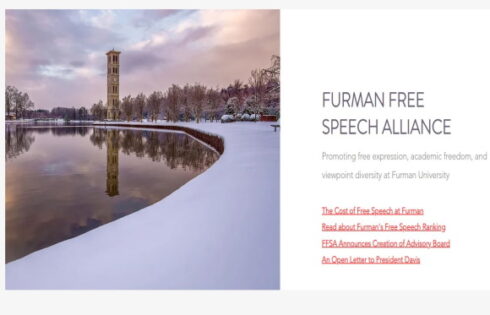
Groups claimed independence from National Students for Justice in Palestine
Two Florida university chapters of Students for Justice in Palestine sued their schools and state officials, alleging a state order to deactivate the groups violated their First Amendment rights.
The University of Florida and the University of South Florida SJP chapters both denied their groups had violated a Florida law prohibiting support for terrorism.
Jacob Baime, CEO of the Israel on Campus Coalition, a pro-Israel umbrella organization, voiced support for the universities. He told The College Fix in a statement emailed on Dec. 22 that “Florida did the right thing, and other states should follow.”
“SJP’s response to the massacre of Jewish families on 10/7 reveals a violent, genocidal ideology spreading on campus,” Baime said. “Universities must act decisively to protect all students. SJP chapters openly supporting Hamas’ attacks cross the line from free speech to incitement and endorsing terrorism.”
The Fix reached out on Dec. 19 via email and Dec. 22 by phone to both universities’ media relations departments for comment on the lawsuits. Neither has responded.
“The Deactivation Order advances unsubstantiated claims that Florida’s SJP chapters have violated the state’s material support for terrorism Statute,” according to the November complaint from the UF chapter of SJP.
The law defines “material support or resources” as referencing “any property, tangible or intangible, or service.”
The USF SJP complaint states that “governors cannot shut down lawful and peaceful student groups because of the views they express. The First Amendment forbids it.”
Even more, “defendants have offered no evidence, and there is none, that USF SJP has ever provided any illegal ‘material support’ to any person or entity or acted at the direction of or in concert with a federally-designated entity,” the complaint stated.
The USF complaint also stated its SJP group “has no financial relationship with National SJP. . . . USF SJP is fully autonomous from National SJP.”
The UF SJP “has no formal relationship with NSJP other than sharing the ‘Students for Justice in Palestine’ name,” according to UF’s complaint. The name “affirms UF SJP’s solidarity with Palestine, and with other SJP chapters throughout the country.”
Florida Chancellor of Education Ray Rodrigues accused both SJP groups on Oct. 24 of violating a Florida law that prohibits “knowingly” providing “material support” to terrorist organizations, as The Fix previously reported.
Rodrigues’ letter also stated that the SJP chapters at UF and USF “exist under the headship of the National Students for Justice in Palestine.”
His deactivation order was “based on the National SJP’s support of terrorism” and issued “in consultation with Governor DeSantis,” according to the letter.
Rodrigues based his assertions on the National SJP’s release earlier that month of a “Day of Resistance Toolkit” in support of Operation al-Aqsa Flood, Hamas’s Oct. 7 attack on Israel.
“Today, we witness a historic win for the Palestinian resistance: across land, air, and sea, our people have broken down the artificial barriers of the Zionist entity, taking with it the facade of an impenetrable settler colony and reminding each of us that total return and liberation to Palestine is near,” according to to the “toolkit” document.
“We as Palestinian students in exile are PART of this movement, not in solidarity with this movement,” the group wrote. “This is a moment of mobilization for all Palestinians. We must act as part of this movement.”
“All of our efforts continue the work and resistance of Palestinians on the ground,” the group wrote.
Education officials sought SJP groups’ ‘express affirmation’ that they ‘reject[ed] violence’
Officials appeared to backtrack on Rodrigues’ order weeks after the publication of his letter, according to remarks he delivered Nov. 9 at a Florida Board of Governors meeting.
“Both institutions [UF and USF] consulted with the Students for Justice in Palestine on their campuses, their registered student organizations,” the chancellor said. “These organizations represented to [the] administration that they are not chartered or under the headship of the National Students for Justice in Palestine.”
“The constitutions of both organizations, which were submitted by them at the beginning of the school year when they were registered as an active student registered organization, clearly state that their organization is not subservient or under the National Students for Justice in Palestine,” according to Rodrigues. “Therefore, the universities have not deactivated their university chapters of Students for Justice in Palestine.”
Rather than continuing to seek deactivation, officials began “working with the two universities to seek an express affirmation” from the groups “that they reject violence,” “that they reject they are part of the Hamas movement,” and “that they will follow the law.”
The Fix reached out to both SJP chapters via Instagram or contact form on Dec. 19, asking whether the groups had been invited to provide these affirmations. No reply has been received.
MORE: Brandeis University bans Students for Justice in Palestine
IMAGE: National Students for Justice in Palestine/Instagram
Like The College Fix on Facebook / Follow us on Twitter





Please join the conversation about our stories on Facebook, Twitter, Instagram, Reddit, MeWe, Rumble, Gab, Minds and Gettr.